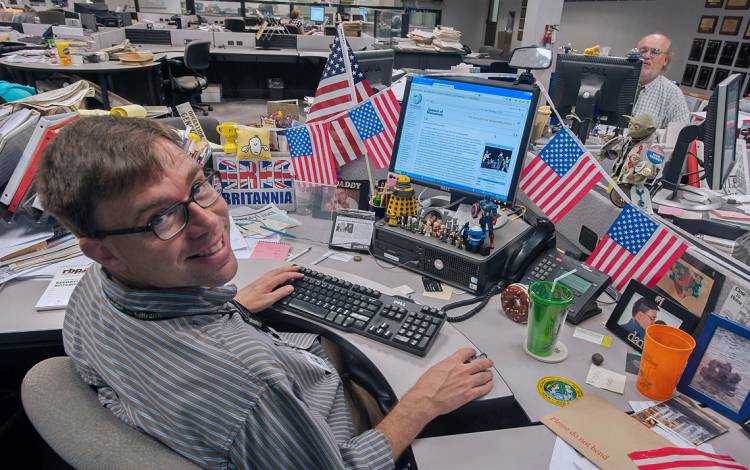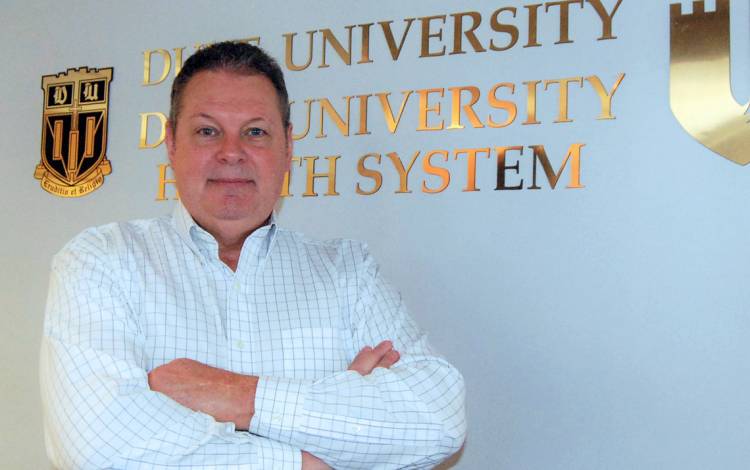How to Manage a Mid-Career Move
An open mind and resilience are keys to finding footing in new position or job field

After leaving a 12-year career as a newspaper reporter for a communications position in the Fuqua School of Business, Greg Phillips felt good about one half of his new job: Digging through faculty research to fish out a story for outside audiences.
But he admitted he wasn’t quite as sure about the rest: The art of strategic communications in the quirky world of higher education.
“All that was a complete mystery to me,” said Phillips, a communications manager at Fuqua.
Whether through a position in a department or deliberate career change within Duke, finding your footing in a new job or career field is rarely easy. And it can be especially trying for people who spent many years doing something different.
Four years into his career at Fuqua, Phillips has made himself at home in his new role. But by looking back at his path and hearing from some Duke experts and others who’ve made similar jumps, there are valuable lessons for others who find themselves facing changes mid-career.
Be Teachable
For Keisha Williams, assistant vice president for Learning and Organization Development, a unit within Duke Human Resources, the most important quality for an employee who’s sliding into a new, somewhat unfamiliar, role is to being willing to learn.
“Being teachable means being open, having an open mind, being able to not only receive feedback, but also to seek it out,” Williams said. “When I’m having conversations with people about this, I tell them to be open, be teachable, don’t take offense to things that may come your way. And if there’s a moment you don’t know something, be honest that you don’t know it and go find out about it.”
Phillips adopted this mindset when he joined the Duke staff, which he said served him well while adjusting to the intricacies of his new role. Figuring out how to operate on a slower, more deliberate pace in higher education, versus the fast-paced daily deadlines of newspapers, was new. So too were summoning ideas for content from faculty who have the bulk of their attention consumed by teaching and research.
But in time, Phillips learned how to work effectively in his new environment.
“When I came in, I was honest,” Phillips said. “I said I don’t know much about parts of the job, but I have an open mind. I know it’s not going to be easy, I‘m not going to walk in and have it be a breeze. I’ve got a lot to learn.”
Be Patient
After spending more than a decade in a variety of roles helping provide Duke University Hospital nurses with crucial information, Steve Kimbrough figured he’d be able to easily transition into a role as a nurse recruiter with Duke Human Resources.
After all, who would know better what Duke’s nursing staff needed better than somebody who came to Duke in 1990 as a nursing assistant?
Quickly, Kimbrough realized the transition wouldn’t be as seamless as he thought. He knew how to relate to nurses but figuring out to find and attract the ones who were right for Duke was a different kind of challenge. His previous position had him bouncing around the hospital, fine-tuning the technology nurses used to access vital patient data, Now, he travels the country, meeting potential additions to Duke’s nursing corps.
“There was a lot to learn,” Kimbrough said. “About 90 percent of what I thought I knew was wrong.”
Kimbrough recalls his early days after the job change in 2002, when he began learning that many of the qualities for an effective nurse don’t show up on résumés. Kimbrough said it took him time to hone his ability to pick out potentially lasting Duke nurses. Now in his current role as a senior recruiter with Duke Central Recruitment, he’s glad he weathered those early days.
“Nobody’s perfect in the beginning,” said Williams, the assistant vice president for Learning and Organization Development.
Do what you do well
While it can be easy to dwell on the challenging parts of a new job, it’s important to remember that there are likely good reasons you were hired for it.
“There may be bumps in the road, but if this transition was what you truly want, you’ll find a way to make it work,” said C.T. Woods-Powell, education and training coordinator with Duke Central Recruitment & The Resource Center.
Kimbrough leaned on his easy rapport with old friends and strangers alike to build the connections that eventually made him an effective recruiter.
Meanwhile, Phillips’ ability to turn complicated data into compelling stories meant he’s been an asset for the communications arm at the Fuqua School of Business.
The lesson is that, while the adjustment may be challenging, don’t lose sight of why you were brought aboard.
“Don’t be afraid to emphasize the strengths you have,” Phillips said.
Have a story idea or news to share? Share your news with Working@Duke.